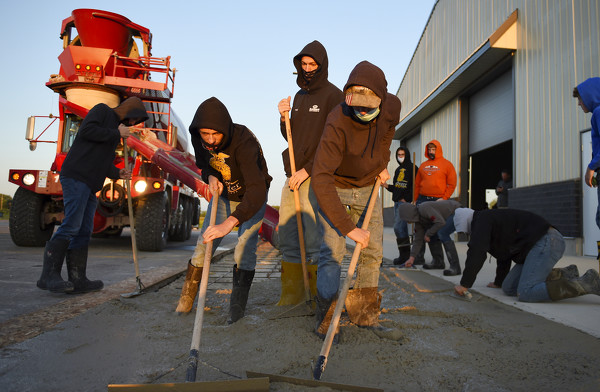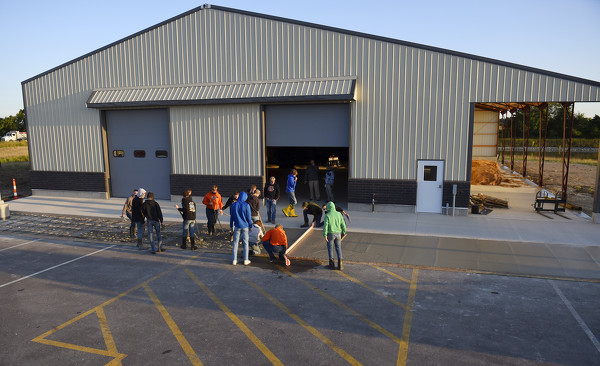Saturday, September 19th, 2020
Animal house
Tri Star students pour concrete for new facility
By Sydney Albert

Photo by Dan Melograna/The Daily Standard
Luke Zwiebel, Aaron Fortkamp, Ben Marchal and other students in Tri Star Career Compact's junior construction class on Friday morning spread and smooth concrete in front of Tri Star's new animal science building.
CELINA - Not long after the first classes at Tri Star Career Compact got underway Friday morning, junior construction students began pouring concrete in front of the new animal science building, an addition that officials say could benefit a number of Tri Star programs.
Work still needs to be done in the new barn, but some animals could be moved in as soon as this weekend, Tri Star's animal health instructor and FFA advisor Mike Seibert said.
Seibert envisions the program bringing in cattle, pigs and poultry and even more "exotic" animals such as alpacas to give students more hands-on experience as part of the animal health program. Larger animals can graze in a pasture to the east of the barn and in a field to the west made available through a partnership with Wright State University-Lake Campus.
A retention pond northeast of the barn could even be used as a fish hatchery for small mouth bass or tilapia down the line, Seibert noted.
It may sound like an ambitious project, but Seibert said the program is still designed to be a teaching environment. The building will introduce new opportunities for the animal health program. Seibert discussed adding elements of meat science into his classes once animals arrive.
Other Tri Star programs could get some use out of it, too, officials said. Med prep students could have access to animals for dissection. Early childhood education students could bring their children to see the animals during field days. Some have even proposed that one of Tri Star's newer programs, information technology cybersecurity, could create a program to help track feed efficiency in individual animals.
Construction students were getting hands-on experience in concrete pouring on Friday thanks to the project - and saving Tri Star about $4,000 in the process, according to director Tim Buschur. Construction of the barn alone cost about $210,000, he added.
Seibert, who has been teaching for 15 years, is excited about the possibilities. Sometimes instructors can stagnate, especially when teaching subjects that are more set in stone, like math, he said. When teaching something like animal science, however, the program has to change and keep up with the times to stay relevant.

Photo by Dan Melograna/The Daily Standard
The new building likely will house cattle, pigs, poultry and other farm animals.



